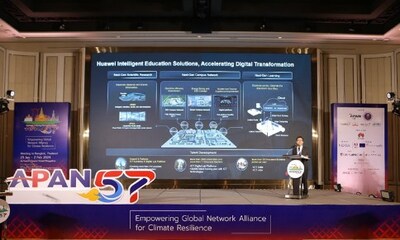Huawei Unveils Wi-Fi 7 at APAN57 to Upgrade the Network Experience for Education
Huawei inspired
the education sector to upgrade its infrastructure by unveiling its
enterprise-class "AirEngine Wi-Fi 7", the latest generation of Wi-Fi
standards solutions that offer a smoother and more reliable wireless network in
high-density, high-bandwidth, and low-latency use cases, such as when accessing
the metaverse and utilizing Augmented Reality/Virtual Reality (AR/VR) for
education.
"The trend in
the education industry is now evolving from digitalization to intelligent
infrastructure," stated Mr. Sheldon Wang, Vice President of
Enterprise Business Group, Huawei Technologies (Thailand) Co., Ltd. During the
57th Asia-Pacific Advanced Network (APAN57) meeting, He presented Huawei's
unwavering dedication to seamlessly integrating ICT elements like connectivity,
cloud computing, big data, and artificial intelligence across the entire
educational spectrum. This commitment aims to foster innovation in teaching,
scientific research, management, and services.
Teaching and learning
have shifted from using traditional blackboards to multimedia tools, from
learning in a fixed location to anytime, anywhere, as well as from one-way
lecturing to more student-centric learning. Scientific research too needs to
solve complex computing and analytics tasks and relies more on technologies
like high-performance computing (HPC), high-performance data analytics (HPDA),
big data, and artificial intelligence, all of which require high-bandwidth and
stable Wi-Fi solutions.
Under the theme
"Leading Infrastructure to Accelerate Education Intelligence",
Huawei showcased technology and innovations for education during APAN57,
focusing on infrastructure upgrades to accelerate technology transformation for
the next generation of education. Leveraging technologies such as optical
network and Wi-Fi 7, Huawei has integrated wired, wireless, office, and IoT
networks to connect campus networks, education and research networks, and the
Internet. This created a single secure, stable, and intelligent network,
enhancing the bearing capabilities of the service system and user experience.
Huawei is ready to
apply its global industry expertise to support the development of ICT
infrastructure, a key factor in the education sector's digital transformation,
in addition to offering key solutions like "Intelligent Education" to
expedite research-focused technology-driven digital transformation.
A special forum, the
"Thailand Medical Research HPDA Infrastructure Innovation Panel," was
organized by Huawei at APAN57, inviting experts from leading medical
universities including Khon Kaen University (KKU), Siriraj Hospital, National
Biobank of Thailand, and King Mongkut's Institute of Technology
Ladkrabang, to exchange ideas and preparedness guidelines for supporting the
development of scientific and medical research. The discussion was led by Mr.
Prayuth TungsaNgob, Huawei Thailand's Chief Technology Officer of Enterprise
Business. Huawei's Scientific Research HPDA Solution adopts an
ultra-high-density design, both in terms of capacity and performance, to make
significant savings in equipment room space, thereby lowering the Total Cost of
Ownership (TCO).
The Huawei AirEngine
Wi-Fi 7 delivers high bandwidth and supports e-classrooms that can use HD video
and audio for teaching. On top of realistic interactivity, the Wi-Fi 7 also
sets a robust foundation to support the next generation of teaching and
learning, such as HPDA and Converged Campus Network, both of which feature
advanced computing and energy-saving capabilities, as well as environmental
friendliness. Huawei plans to promote the industry holistically under the
Digital Talent Ecosystem and will continue to cooperate with policymakers and
partners to cultivate 50,000 talents in Thailand by 2027.































Leave A Comment